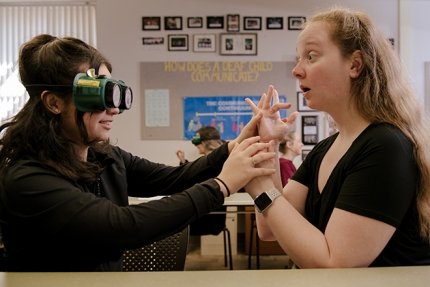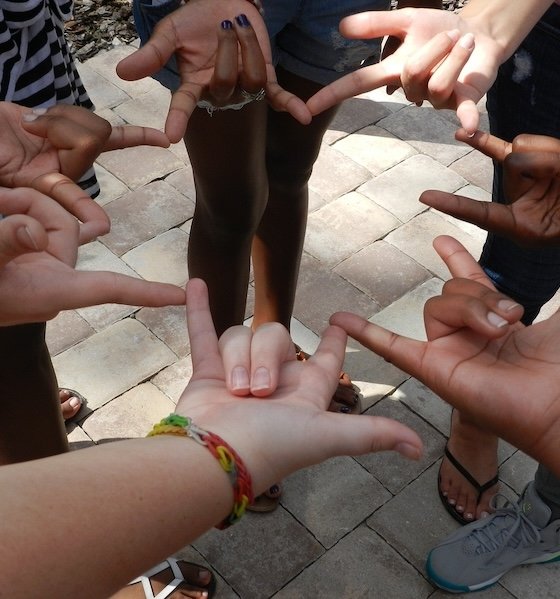
American Sign Language (ASL) and English Interpreting
As one of just two American Sign Language/English Interpreting bachelor's degree programs in the Mid-Atlantic Region, our ASL/English Interpreting for the Deaf/Hard of Hearing program prepares you for a variety of job settings such as legal, educational, medical, and more.
- Degrees & Offerings
-
- B.S.
- Location
-
- Bloomsburg
- Program Contact
-
ASL Program Coordinator, Instructor

It's a rigorous and highly competitive course of study, requiring copious amounts of hands-on training that's obtained through in-class practice and personal interaction with the local Deaf community. A combination of empirical knowledge, as well as practical application, will be employed in order to achieve the level of excellence required in this field.
This program provides specialized training for students seeking to become American Sign Language interpreters. In addition to learning to interpret, students also receive a strong education in Deaf culture and related communication issues. As an ASL/English interpreting major, you'll take six semesters of ASL courses and learn about the linguistics of ASL and Deaf culture. Interpreting courses include introductory classes, translation, transliteration, and consecutive and simultaneous interpreting, as well as a seminar and practicum.
Courses and Curriculum
Our program offers a Bachelor’s of Science degree in ASL/English Interpreting. It's a rigorous four-year program requiring several out of class hours interacting with the Deaf community and attending Deaf events. In addition to 45 semester hours in general education requirements, the major in interpreting requires a total of 57 semester hours between American Sign Language and culture, and in interpreting; the remaining 18 semester hours required for a bachelor's degree come from elective courses. Students are encouraged to also minor or have a concentration in another content area.
Degree Requirements Degree Works
Note: Degree requirements effective for enrolled students beginning Fall 2023. All enrolled students, including matriculating students prior to Fall 2023, can review their degree program requirements and track progress to degree completion with our degree audit and advisement tool, Degree Works.
Students desiring to graduate with a Bachelor of Science degree in ASL/English Interpreting should familiarize themselves with this document. Questions concerning the procedures should be directed to the student’s advisor or the Program Coordinator of the ASL/English Interpreting Program.
The following are admission, monitoring, and exit procedures and requirements for all students who major in ASL/English Interpreting at Commonwealth University. In setting these requirements, attention was given to all national standards and criteria for interpreter candidates.
Due to cohort design and structure of the course sequence, the number of transfer students accepted into the American Sign Language/ English Interpreting Program is limited. This program typically can be completed in four years for students who start as freshman. Transferring into this program may extend this length of time.
To apply, students must complete the appropriate requirements for admission (see the Admission, Monitoring, and Exit Procedures packet). Transfer students must complete 20 hours of certified interpreter observation and 20 hours of community service during the first year they are at Commonwealth University- Bloomsburg.
Please contact the program coordinator for details on these requirements. Prior to admission, transfer students must participate in an interview with the faculty.
If transferring ASL course work from another institution, an ASL placement test is required at no cost to you. This will ensure transfer students have the competency and are placed in the appropriate level of ASL.
The ASL course number at the institution where credits are being transferred may not be equivalent to the ASL course at Commonwealth University- Bloomsburg. The placement test will determine the transfer student's level of ASL.
Please note that all students must pass an ASL proficiency examination at the completion of ASL IV in order to advance within the program. The American Sign Language Proficiency Interview (ASLPI) is administered through Gallaudet University.
All students who wish to continue into ASL V or other advanced-level interpreting course work must take the ASLPI and achieve a level 2 out of 5. Failure to pass this performance examination will require remediation, corrective action and/or re-examination. This will delay matriculation and limit access to advanced coursework.
The practicum experience for ASL/English Interpreting students provides opportunities to observe and interpret in various settings under direct supervision of a certified interpreter mentor.
This practicum is an integral part of the Bachelor of Science degree program in ASL/English Interpreting at Commonwealth University- Bloomsburg. The experience provides the student with the opportunity for carrying out professional responsibilities under appropriate supervision, direct observation, and modeling of effective interpretation.
Each practicum experience shall be collaboratively developed and documented by the university supervisor, mentor, and student. All practicum settings shall be conducted in sites equipped to provide the application of concepts learned through university coursework.
These experiences should enhance and extend the experiences provided throughout the program. The practicum provides experiences with varied groups and various service-delivery models reflective of current practices in the profession.
- To provide the student with professional experiences and competencies under the full-time supervision of certified professionals in a variety of settings.
- To provide experiences for understanding of the practical realities, working conditions, and professional responsibilities of practicing interpreters.
- To provide feedback for the interpreting student through continuous evaluation, skill-based feedback, task modeling, and guidance by cooperating supervisors and mentors.
- To provide opportunities for developing self-direction, professional interests, attitudes, ideas, and techniques of interpreting through self-evaluation.
- To provide experiences for observation and participation in professional activities related to interpreting, such as RID meetings, NAD meetings, interpreting workshops, and social activities where Deaf people are present.
- To provide experiences to the interpreting student in recognition of and fostering of individual and cultural differences found among the clientele they will be serving.
- To provide opportunities for the interpreting student to become aware of the importance of human relations as they apply to Deaf consumers, hearing consumers, and members of the community at large.
Upon completion of this program students will be able to:
- Produce and carry out the ability to create a content centered conversation.
- Identify and produce vocabulary using advanced grammar.
- Produce and comprehend narrative stories that include appropriate body movements and grammar.
- Describe various aspects of the Deaf culture, Deaf communities, and the diversity within the communities.
- Assess outcomes and implications of systemic institutions and their impact on the psychological and sociological impact of Deaf individuals.
Why Choose ASL and English Interpreting?
The ASL/English Interpreting Program prepares our students to become competent professionals who employ critical thinking skills and ethical practices to meet the diverse needs of the communities they serve.
Strong Curriculum
Commonwealth University is committed to the preparation of interpreters of high quality. The development of quality for beginning interpreters is a “team” process. The competencies developed by practicum students during their practicum are the outcome of a cooperative endeavor between the practicum mentor, university supervisor, and practicum student. The emphasis of the interpreting practicum experience is on developing broadly educated individuals who are knowledgeable, skilled, and professional in a variety of interpreted settings.
Careers
You'll study public speaking, the history, education and guidance for the Deaf, and English grammar, with electives in fingerspelling and numbers, interpreting in the education setting, and working with DeafBlind populations.
Clubs and Organizations
- IMAGE is a sign language performance group that consists of members ranging from freshmen to seniors. Our main goal is to promote American Sign Language (ASL) as a true language. To do this, we use ASL with music to make a show that is aesthetically pleasing to your eyes and ears. IMAGE is open to all majors and all signing levels. Our show takes place in the spring semester, usually in April but sometimes in March. You can follow us via social media for more information.
- Our Interpreter Club is open to any student but is geared towards the ASL/English Interpreting Majors. We discuss the different interpreting settings, signing techniques, interpreting skills, and other topics related to our program. We hold a conference on campus biannually that involves both students and the interpreting community. Interpreter Club is a great way to meet the other students in the interpreting program and stay involved!
- Signify is a club that meets to practice and improve our American Sign Language skills. Our meetings are held entirely in ASL, and we discuss various topics related to the language and Deaf culture.
Awards and Recognitions
Outstanding Senior Award
Mark Jackowski '03, Lisa Senatore '04, Kathleen M. Bartel '05, Lauren Lewis '08, Kelly Klinedinst '11, Kristen Sharpless '12, Heather Hamilton '13, Audrianna Osorio '14, Dawn Grabowski '15, Alexa Cantalupo '16, Nora Reade '17, Emily Gowin '18, Emily Pearson '19, Kate Andres '20, Margaret Lyman ' 21, Stephanie Novitski '22, Caitlyn Lysogorski '23
Licensure and Certification
Professional licensure/certification laws and regulations vary from state to state and are subject to change without notice. If you are planning to pursue a professional credential in a state other than PA, it's highly recommended you contact the appropriate state licensing agency to seek guidance and verify requirements. A CU program that leads to state licensure or certification in PA may not meet requirements in another state.
The Uncommon Difference
Careers
There is a high demand for American Sign Language interpreters, according to the U.S. Bureau of Labor Statistics, and demand will continue to grow by 20% through 2031.
Potential Job Opportunities
- Educational Settings
- Vocational
- Video Relay Service
- Medical
- Mental Health
- Religious
- Legal
Top Skills Employers are Looking For
- concentration
- dexterity
- cultural sensitivity

Program Goals
Graduates of our program will be critical thinkers and life-long learners of interpreting practices. Graduates will be sensitive to and understand various cultures, diversity, social justice, and acts as an ally to the Deaf community. Graduates will be able to competently demonstrate interpreting skills in a variety of settings and among diverse populations. Graduates will be equipped with the knowledge and skills related to the interpreting profession. Graduates will display linguistic and cultural competencies.

Philosophy
The ASL/English Interpreting Program believes in a diverse, safe learning environment that provides opportunities for real-world experience, and fosters connections with the Deaf community. We commit to instill the importance of life-long learning and being an ally to the Deaf community.

Program Values
Collaboration, Community, Critical Thinking, Diversity, Excellence, Integrity, Knowledge, Opportunity, Respect, Personal and Professional Growth, Ally, Life-long Learners, Ethical Responsibility, and Striving for Interpreting Excellence.
ASL and English Interpreting Program Contacts
Applying to This Program
Apply
-
Application Process
Review the step-by-step process whether you're a first-year student, transferring to CU, or more.
-
Apply Now
By starting your application, you gain access to your personalized application portal to view your progress.
-
Scholarships
As the largest comprehensive university in north central and northeastern Pennsylvania, CommonwealthU works hard to provide a world-class education that consistently rates among the best values in the nation.
Explore More
-
Explore Commonwealth University
There's no better way to learn more than to experience Commonwealth University for yourself! Set up a campus tour or connect with us virtually.
-
Connect with Your Admissions Counselor
Applying to college is a big step. You have questions, and we have answers!
-
Understanding Financial Aid
Financial Aid can be a complex topic. Our Financial Aid team is here to tell you what you need to know and help you navigate the financial aid process.





